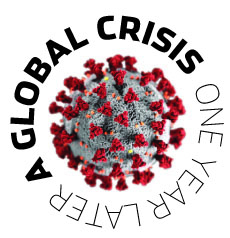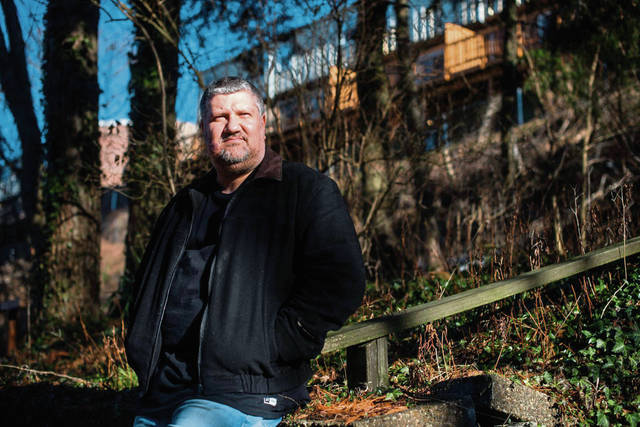'Reverberation of grief': Covid losses take toll on Western Pennsylvania residents, communities
It has been nearly a year since the world of Ludmil Velev changed forever.
For a few months in early 2020, his mother was visiting Pittsburgh from Bulgaria, thrilled to be with her granddaughter.
“I’m happy I spent time with her,” said Velev, 44, of Greenfield. “She was extremely happy to be with us.”
The smiles and joy turned into tears and a fight for life — something neither mother nor son could have anticipated as the coronavirus crept into Western Pennsylvania in March 2020. Ofelia Rousseva, 78, died March 19, becoming the second reported death in Allegheny County connected to covid-19. Velev spent 10 days afterward in a hospital battling the disease himself.
Over the past year, his mind often has drifted toward her memory, how she made friends easily and formed a ladies choir in her native country. The pair had talked about life. What Rousseva told her son soothes his mind.
“She has told me that she would be happy if she goes fast,” he said. “I think that this is the only thing giving me relief, that she didn’t suffer.”
* * *
The people who have died during the pandemic are ones who made our communities what they are. Veterans, collectors, musicians and homemakers.
The ones who stood at the front of the classroom and ran the restaurant in town. They were churchgoers, volunteers, athletes and retirees. They had made Southwestern Pennsylvania their home.
With the virus cutting their lives short, there are jokes left untold, loving nicknames no longer uttered and a golf partner gone.

“These are people who live in our community, and they might be our friends or our neighbors,” said Dr. Carol Fox, chief medical officer at Greensburg-based Excela Health.
The death toll in Allegheny and Westmoreland counties is far below 1% of the total population. That doesn’t diminish the suffering loved ones and communities have faced during the past year. In Allegheny County, 1,769 people have died from covid-19. Another 688 have succumbed to the disease in Westmoreland, according to the state Department of Health. That’s enough to fill more than 13 Spirit Airbus A320s from Arnold Palmer Regional Airport to Orlando or standing room only at Soldiers & Sailors Memorial Hall in Oakland.
Across the region, there have been 3,643 deaths related to the virus.
Nearly everyone has been impacted by the pandemic. It has exacted a toll in many ways, from the loss of life, businesses and jobs to fear of the unknown.
The Rev. Felicia Brock of First Baptist Church in Tarentum has been delivering hopeful messages to her parishioners. First, it was hope that a vaccine would nudge the world back towards normalcy. Now, it’s trying to find a vaccine appointment.
“It is my job to deliver messages of hope,” she said. “That tends to comfort people, quite frankly, to know that God is there and in control and hope for the future that it won’t always be this way.”
* * *
Velev said he wasn’t too concerned about his mother’s condition at first. She was tired for about a week or so. Still, she didn’t seem to be in bad shape. He later learned from her doctor in Bulgaria that she had a heart issue, though it was not considered life threatening, at least on its own.
One morning, he called 911. She stopped breathing. He did CPR.
“She didn’t even know she was going to die. No one did,” he said. “She just died suddenly.”
Her cause of death was ruled acute respiratory distress syndrome because of a covid-19 infection, according to medical examiner reports. She tested positive for the virus after her death.
“She stopped breathing. She just stopped,” Velev said. “The virus hit her really hard on the heart.”
Velev, also sick with covid-19, found himself in the hospital, struggling to breathe at times while dealing with the depression his mother’s death wrought. But he knew his daughter and wife needed him. He is still dealing with lingering pain, and he tires quickly.
“I can say now I am living a second life because I thought I was going to die,” he said.
* * *
Hospital staff becomes invested in the well-being of patients, Fox said. So when the mortality rate at Excela Health’s three hospitals in Westmoreland County skyrocketed, it was tough on nurses and doctors. Across November, December and January, the mortality rate was two to three times higher than normal for the health system. Those three months saw 500 people — 73% of the death toll in the county — die, according to the state Health Department.
“Even though we’re accustomed to caring for patients who died or are dying, seeing that volume of them was very difficult for staff,” Fox said.
Patients’ families typically rely on doctors and nurses to provide regular updates on their loved ones, as visitation was prohibited except in end-of-life situations.
“You become pretty close to somebody in a short amount of time because, frankly, you’re very intimate with them,” Fox said.
Staff at long-term care facilities have seen their share of heartache, too.
Bishop Larry J. Kulick of the Greensburg Catholic Diocese recalled a day in late March 2020 when a longtime member of St. James Parish in New Alexandria was dying from covid-19 at a Latrobe care facility. Visitation at such facilities had just ended, and many uncertainties remained about the virus.
Kulick, who was pastor of St. James before being appointed bishop, vividly recalls donning a mask, gown and gloves to enter her room. He brought her the sacrament. Her family gathered outside an open window so they could hear his prayer and participate. It was a powerful yet painful moment, he said.
“As a clergy person, the privilege and honor being with someone at that time …
“Sometimes, the parish family is the extension of a natural family,” Kulick said.
It is important for leaders to share messages quelling fear, said Brock, the Baptist pastor. For a flock cut off from a weekly social outing with church services shifting to virtual, facing numerous uncertainties can wear on a person’s mental state, she said.
“We teach that you shouldn’t be afraid,” she said.
* * *
Feelings of grief may have crept in for people who survived the past year, even if they didn’t lose a loved one, said Amy DeGurian, a professor at the University of Pittsburgh who specializes in grief and loss. We all have lost “a sense of normalcy, a sense of safety and a sense that the world makes sense,” she said.
There are numerous ways grief can manifest itself, she said.
Front-line workers may experience “delayed grief” as they continue with the day-to-day intensity of making life and death decisions that could affect their own well-being.
“The realization of what they accomplished and what they faced will be paramount,” DeGurian said.
Another type of suffering comes for those who lost a loved one but could not partake in the typical rituals that bring comfort, such as a funeral.
“So many people did not have that opportunity, but it doesn’t mean that that need disappeared,” she said.
DeGurian is looking ahead.
She thinks there need to be services and support groups put in place to help those struggling with pandemic-related grief, ranging from front-line workers to those in socially and economically disadvantaged areas. The pandemic hasn’t impacted everyone in the same way, but she expects an influx of need for social supports as the world moves toward normal.
It’s not clear yet when will be the right time, but it eventually will be important to “memorialize and commemorate and mark what has happened so we can do justly by all those peoples’ grief,” she said.
Communities as a whole can experience grief, too, after losing hundreds of members.
“The reverberation of grief is not just felt by those at the center of it,” she said.
* * *
Velev expected his mother to live a much longer life. But her unexpected death set off a wave of hope for his family.
A GoFundMe page brought in $13,000 for funeral expenses and financial help. Without that, it would have been tough to survive, Velev said.
Friends brought meals and groceries over for about a month after Rousseva’s death.
“I’m really grateful and amazed for the amount of people who were helping us,” he said. “Thanks to them, we are fine.”
Renatta Signorini is a TribLive reporter covering breaking news, crime, courts and Jeannette. She has been working at the Trib since 2005. She can be reached at rsignorini@triblive.com.
Remove the ads from your TribLIVE reading experience but still support the journalists who create the content with TribLIVE Ad-Free.

